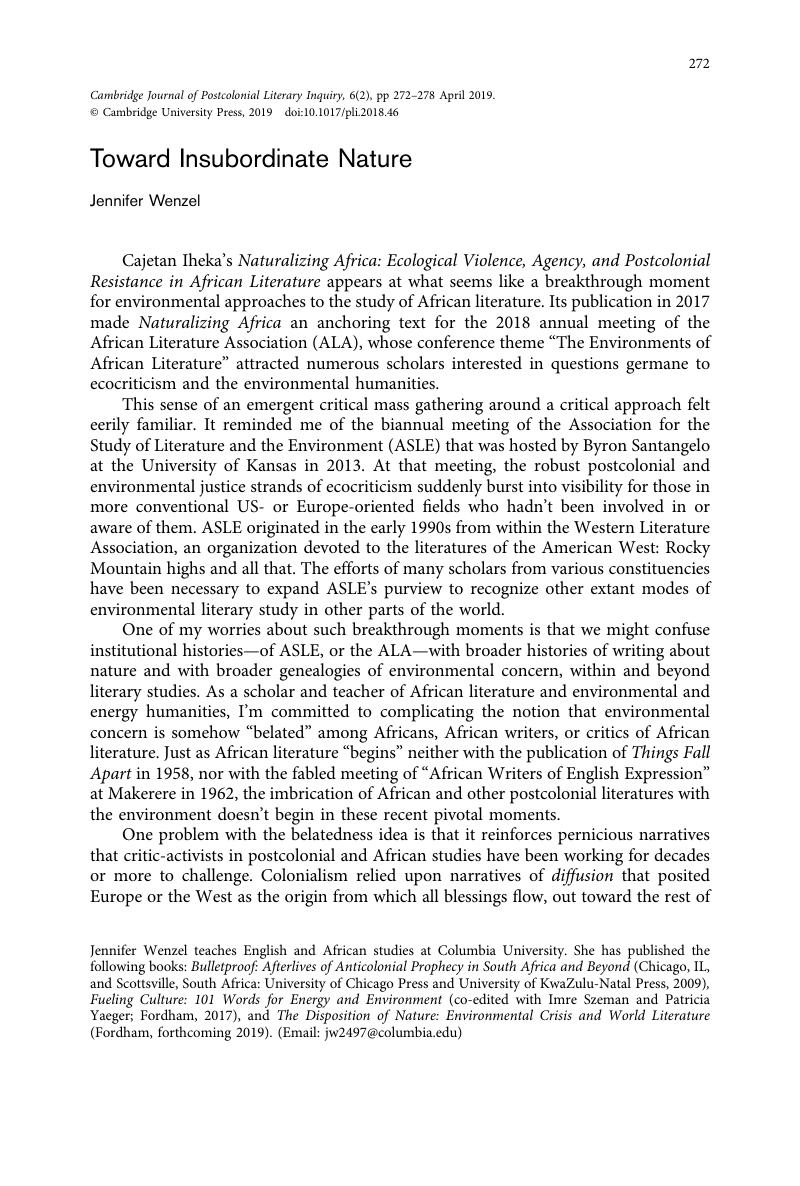Published online by Cambridge University Press: 26 March 2019

1 Nixon, Rob, “Environmentalism and Postcolonialism,” in Postcolonial Studies and Beyond, eds. Ania Loomba, Suvir Kaul, Matti Bunzl, Antoinette Burton, and Jed Esty (Chapel Hill, NC: Duke University Press, 2005): 233–251 Google Scholar , esp. 235.
2 Nixon, Rob, Slow Violence and the Environmentalism of the Poor (Cambridge, MA: Harvard University Press, 2011)CrossRefGoogle Scholar .
3 Said, Edward W, Culture and Imperialism (New York: Vintage, 1993), 271 Google Scholar .
4 Wenzel, Jennifer, “Reading Fanon Reading Nature,” What Postcolonial Theory Doesn’t Say, eds. Ziad Elmarsafy, Anna Bernard, and Stuart Murray (Routledge, 2015): 185–201 Google Scholar .
5 Martínez-Alier, Joan, The Environmentalism of the Poor (Cheltenham, England: Elgar, 2002), 172 CrossRefGoogle Scholar .
6 Iheka, Cajetan, Naturalizing Africa: Ecological Violence, Agency, and Postcolonial Resistance in African Literature (Cambridge and New York: Cambridge University Press, 2018), 9 Google Scholar .
7 Fanon, Frantz, The Wretched of the Earth, trans. Constance Farringdon (New York: Grove, 1968), 44 Google Scholar .
8 Escobar, Arturo, Territories of Difference: Place, Movements, Life, Redes (Chapel Hill, NC: Duke University Press, 2008), 121 CrossRefGoogle Scholar .
9 Iheka, Naturalizing Africa, 2, 12. This non-anthropocentrism is arguably already implicit within environmental justice, construed most broadly. In The Environmentalism of the Poor, Joan Martínez-Alier notes that “environmental justice” signifies both the history of social movements in the United States against environmental racism, as well as Rawlsian philosophical and ethical inquiries into “the allocation of environmental benefits among people including future generations, and between [human] people and other sentient beings” (168). For a discussion of the implications of this multifold sense of environmental justice for what we might understand as a Fanonian/Saidian “more-than-humanism,” see Wenzel, Jennifer, “Turning Over a New Leaf: Fanonian Humanism and Environmental Justice,” in Routledge Companion to the Environmental Humanities, eds. Ursula K. Heise, Jon Christensen, and Michelle Niemann (Routledge, 2017): 165–173 Google Scholar .
10 Iheka, Naturalizing Africa, 22–23.
11 Iheka, Naturalizing Africa, 85.
12 Ngozi Adichie, Chimamanda, “Memoire,” Curse of the Black Gold: 50 Years of Oil in the Niger Delta, ed. Michael Watts (Brooklyn: powerHouse, 2008): 102–103 Google Scholar , esp. 102.
13 Fanon, The Wretched of the Earth, 316.
14 Iheka, Naturalizing Africa, 86, 4.
15 Iheka, Naturalizing Africa, 8, 15, 60.
16 Iheka, Naturalizing Africa, 93.
17 Iheka, Naturalizing Africa, 160.
18 Christian, Barbara, “The Race for Theory,” Cultural Critique 6 (1987): 51–63 CrossRefGoogle Scholar , 55.
19 Iheka, Naturalizing Africa, 59–60.
20 Iheka, Naturalizing Africa, 16–17.
21 Ranging far beyond the immediate context of Iheka’s Naturalizing Africa to the conventions of scholarship more broadly, one systemic/structural problem with claims that attention to x, y, or z is “belated” (and which the work at hand promises to remedy) is precisely the politics of citation and the acknowledgement (or, more often, disregard) of previous work that has in fact been done.
22 Iheka, Naturalizing Africa, 99.
23 Iheka, Naturalizing Africa, 101.
24 Iheka, Naturalizing Africa, 98, 96.